 |
 |
 |
 |
 |
 |
|
|
||||
|
FEATURE |
Contributors |
|||
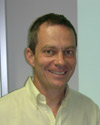 |
Adam
Kilgarriff
Adam Kilgarriff is a research scientist working at the intersection of computational linguistics, corpus linguistics, and dictionary-making. Following a PhD on "Polysemy" from Sussex University, he has worked at Longman Dictionaries, Oxford University Press, and the University of Brighton, and is now Director of two companies, Lexicography MasterClass Ltd and Lexical Computing Ltd, which provide software, training and consultancy in the research areas. He is also a Visiting Research Fellow at Sussex University. He started the SENSEVAL initiative on automatic word sense disambiguation and is now active in moves to make the web available as a linguists' corpus. He is a Board member of European Association for Lexicography (EURALEX) and former president of the Association for Computational Linguistics Special Interest Group on the Lexicon (ACL-SIGLEX). |
|||
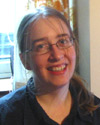 |
I first became interested in learner's dictionaries more than 10 years ago while teaching English in Lithuania. I became a lexicographer with Cambridge University Press in 1999 and since then I have been involved in several ELT publications including Cambridge Advanced Learner's Dictionary, Cambridge Learner's Dictionary, the CD-ROM versions of the Macmillan English Dictionary and Macmillan Essential Dictionary as well as the Macmillan Schools Dictionary website. I have contributed to several websites – writing articles, designing web pages as well as adapting and creating interactive activities and games. I work from my home in Perthshire and most of my spare time is taken up with my baby son Aonghas (Gaelic for 'Angus') and walking my parents' border collie, Misty.
|
|||
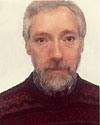 |
I come from Leeds. I did my first degree at the University of Cambridge, and then a Postgraduate Certificate in Education, during which I quickly abandoned my ambition to teach children in the UK state system. But at the end of that year I got a summer job teaching English as a foreign language to adults, found that I liked it, and I've never looked back since. I've lived in Poland since 1991. I live in As well as Inside Teaching (Macmillan), I'm co-author of The Pronunciation Book (Longman), one of the authors of Bridges (Klett) — an adult course for German-speaking learners — and the PONS Polish-English Dictionary (LektorKlett). At the moment I'm working on pronunciation materials for Polish and international readerships, and starting work on another Polish-English dictionary. I like studying languages and tracing connections between them, and I'm — still — intrigued by the question: Given that so many people in the world learn foreign and second languages informally, without books, teachers and so on, how can formal instruction help most effectively, as opposed to interfering with the learning process? I'm also keen on walking, travelling by train, photography, history, architecture, landscape, folklore and so on. I spend an enormous amount of time listening to music, and if I get reincarnated I want to be a musician next time round.
|
|||
 |
Kerry has a first degree in computational linguistics and an MA in theoretical linguistics from the University of Manchester, specialising in syntactic theory. For several years she worked as a researcher at Manchester and Essex universities, where in connection with European projects on machine translation, she was involved in computational lexicography, co-ordinating research in computational descriptions of compounds and collocations, and presenting her work in various international academic contexts. In 1993 she joined Cambridge University Press as a lexicographer/editor and grammar consultant, and worked on a large number of Cambridge learner's dictionaries, including the English Pronouncing Dictionary, the Cambridge International Dictionary of Phrasal Verbs and the Cambridge Learner's Dictionary in print and CD-ROM versions. In June 2001 Kerry moved to York where she now works as a freelance editor/lexicographer and is involved in a range of dictionary and grammar projects. Among the publications she has contributed to are Advanced Grammar In Use (2nd Ed.) and the Cambridge Advanced Learner's Dictionary for Cambridge University Press, the Collins COBUILD Elementary Grammar (2nd Ed.), Macmillan Phrasal Verbs Plus and the Macmillan School Dictionary. As well as being the regular author of the MED website's 'Word of the Week' column, she regularly writes for MED Magazine and co-authors grammar reference material for onestopenglish. Most of her spare time is spent looking after her two young sons Tom and Sam, though she enjoys walking, swimming and any opportunity to travel.
|
|||
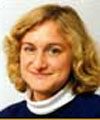 |
Hello, my nameís Hilary Nesi, and I am interested in studying the way language is used in colleges and universities. There are lots of different aspects to this topic Ė I study the way learners of English use dictionaries, the way university staff and students use English to write and speak, and the impact of technology (such as email and the World Wide Web) on academic language use. I work in the Centre for English Language Teacher Education (CELTE) at Warwick University, and I teach on undergraduate and postgraduate courses, and supervise research students. When I am at work I am very, very untidy Ė visitors to my office usually canít find a place to sit down because there are books and papers everywhere. I donít usually put things away because if I do I canít find them again! Every summer I promise myself that I will tidy my office, but I never do because I am always too busy with other more interesting things. When Iím at home I am not like that at all Ė I actually like doing the housework, although I must say I prefer cooking (and eating) to cleaning up afterwards. I like being with my family, and friends, and pets, and I like to read and go to the cinema and the theatre. I also go to the gym for keep fit classes, but I always stay at the very back of the class where the instructor canít see me, in case I make a mistake. I think my students would be surprised if they knew this, because at work I am usually at the front of the class! You can find out more about me on the CELTE staff webpage
http://www.warwick.ac.uk/CELTE/staff/. |
|||
| Meet the Editor | ||||
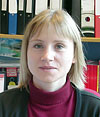 |
Kati
Sule
I come from Hungary. I studied English Language and Literature at the University of Szeged in south-east Hungary where I also completed an English Language Teaching degree. I taught English as a foreign language in Hungary and in the Netherlands. I am Managing Editor of the Macmillan Dictionaries series and was editor of the Macmillan English Dictionary Workbook. I am also one of the editors of the Macmillan English Dictionaries resource site. I live in Amsterdam and frequently travel to the UK. I'm a keen but rather lazy runner. In my free time I enjoy playing squash, watching films and reading. |
|||
| Cover photographs
© Digital Vision/Getty RF (new words - love and neologisms), Imageshop/Alamy (new words - 2005 review) Cover design by Mairi MacDonald |
||||
|
|
||||